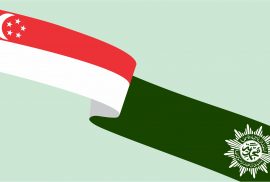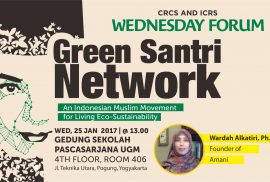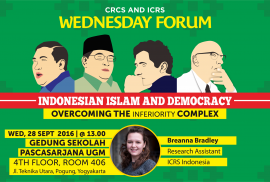A coverage of Mark Woodward's presentation at CRCS-ICRS Wednesday Forum on the Muhammadiyah Association of Singapore.
Muhammadiyah

Abstract:
The Green Santri Network aims to be a socio-ecological movement by Indonesian Muslim groups, using Muslims’ own sensibility and ‘thought language’ to effectively disseminate messages about Islamic ecological values for survival and sustainability and to advance the idea of relocalization, or returning to a smaller scale, as self-reliant communities with simpler ways of living and with self-local governance. It comes out of my research into how Indonesian Muslim groups, including both the large-scale Muhammadiyah and Nahdlatul Ulama and two examples of green intentional communities, Hidayatullah and An-Nadzir, can contribute toliving knowledge transmission or murabbias a way to make sustainability education relevant in the Islamic symbolic universe in the Indonesian context,based on the understanding that more than intellectual ability is needed to comprehend this knowledge; it must be made personal by living it.
Speaker:
Wardah Alkitiri earned her Ph.D. in Sociology at the University of Canterbury, New Zealand, in 2016. Her dissertation was entitled “Muhammad’s Nation is called “The Potential for Endogenous Relocalisation in Muslim Communities in Indonesia”. She is founder of AMANI, a not-for-profit organization that aims to promote ecological sustainability through entrepreneurial creativity in Jabodetabek and Central Java.

Abstract
Indonesian Islam connotes a pluralistic form of faith that is open and deeply engages local-specific cultures that concurrently emphasize a rigorous pursuit of social justice and equality for all. Despite the voluminous scholarship on Indonesian Islam, its correlation with Muhammadiyah’s “Islam Berkemajuan” and Nahdhatul Ulama’s “Islam Nusantara”—each having its own vision for a good society—remains woefully unexplained. This paper explores the interplay between Indonesian Islam and the praxis of democracy within the historical context of overcoming an apparent inferiority complex suffered by some segments of the Muslim community. The authors argue that as much as Indonesian Islam may have proven itself to be distinct from ‘the other Islams’, commonly found in its birthplace in the Middle East, there is still much to be desired for in terms of how to confidently overcome the historical baggage as a once colonized people. Using Said and Foucault’s analytical frameworks, the paper argues for a less humble attitude toward the propagation of Indonesian Islam to the outside world, given the protracted period of instability in the Middle East, ongoing terror attacks in different parts of the world and the politics surrounding Islamophobia.
Speaker
Breanna Bradley is an undergraduate student at Georgetown University’s Edmund A. Walsh School of Foreign Service located in Washington, District of Columbia, USA. Bradley’s studies focus on the relationship between culture and politics in Southeast Asia. She is currently a research assistant at the Indonesian Consortium for Religious Studies (ICRS), a Ph.D. program in Inter-Religious Studies located at Universitas Gadjah Mada, Yogyakarta, Indonesia. She has previously held positions as an undergraduate research fellow at Georgetown University’s Berkley Center for Religion, Peace and World Affairs and as a program coordinator for Georgetown University’s D.C. School’s Project, a program aimed to provide English language access for the immigrant community of the Washington DC area. She is interested in the role that Indonesian Islam plays in Indonesian culture and politics and is currently assisting with research surrounding the Tabot festival, a festival with its roots in Shia Islam celebrated by a majority Sunni community every year in Bengkulu, Sumatra.




